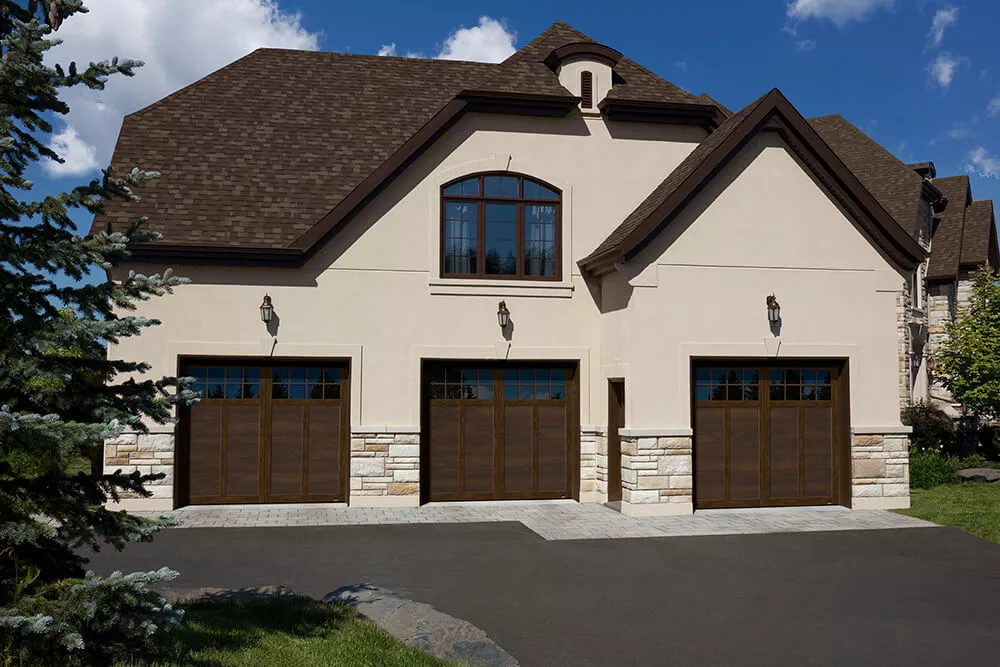Fake news is everywhere these days. It’s moved beyond the Internet and people feel free to make whatever claims they want. Often, people fail to take the time to verify those claims and they become accepted as the truth. However, saying something and it being factual are not the same thing. In this post, we want to debunk some of the fake news that has grown up around garage doors. While many of these have been around for some time, others are surprisingly fresh minted.
Whether you own a garage door and are looking to care for it properly or you’re shopping around for one, this guide will help you make sense of what’s out there and separate myth from reality.

They’re all the same
One of the first myths we need to put to rest is that all garage doors are made the same. This one is obviously untrue. All you need to do is look at the wide range of materials in use to know that it’s fake news. Sure, many doors are made from metal, but you’ll also find wood and fiberglass in use today. All of them bring something different to the table in terms of durability, warmth, beauty, uniqueness, or resistance to weathering. It’s really all about finding the right material for your specific needs and installation requirements.
For instance, let’s talk about thickness. A conventional double garage doors that measures 16 x 7 feet should be around 1 ¾ inches thick. It should be made from two layers of surface material (wood, aluminum, fiberglass, or steel), with a layer of polyurethane foam in the center. This way, you get a strong, durable door that is lightweight but also able to help control temperature fluctuations within the garage and your attached home.
Garage doors don’t need to be insulated
It’s easy to see how this one got started. After all, the garage is just a room that needs to be sealed. It’s not part of the living space of the home, so temperature regulation isn’t that big a deal, right? Wrong. Installing a weathertight, insulated garage door is smart for a number of different reasons, including the following:
- The garage creates a "fourth" wall if it’s attached to your home and affects temperature regulation inside.
- The garage affects the temperature in any bedroom above it.
- An insulated garage door with weatherstripping helps reduce energy consumption.
- Insulated helps keep the garage warmer in the winter and cooler in the summer.

Garage door repair is a DIY thing
This is another myth that’s easy to see where it got started. After all, you can do a lot of the maintenance on your garage door yourself. From lubricating the weatherstripping and the track to tightening nuts and bolts, you can keep it in good shape. However, when it comes to actual repairs, it’s best to leave those to the professionals. Why is that? Consider the fact that your garage door weighs somewhere between 100 and 200 pounds and you will begin to see why. We recommend that homeowners take a proactive stance, though. Inspect the garage door, track, motor, and springs regularly. Note any kind of damage, and handle minor upkeep needs. For other more complicated issues, contact us at Mar‑Lin Dock & Door, we are qualified to pinpoint and remedy any abnormality.
Garage doors don’t require much maintenance
This one is a mixture of truth and fiction. To be clear, your garage door doesn’t need a lot of maintanance. However, it does require some TLC throughout the year. We recommend a monthly visual inspection and lubricating the moving parts twice per year or so. If you use your garage as the primary entry point to your home, like 70% of Americans with garage door openers, then you’ll need to be even more proactive about it. Not sure what’s involved with garage door maintenance? Don’t worry. Refer to this guide for the care and maintenance your garage door needs and that you can do yourself.
Garage doors normally make lots of noise
Sure, the garage door is going to make noise. That’s particularly true if you have an older opener that uses a chain instead of a belt. Just consider the number of components of your garage door and opening system! With that being said, your door shouldn’t sound like it’s going to fall apart every time it opens and closes. During your monthly visual inspections, take a moment to listen to the door, as well. Open and close it and note any unusual sounds or vibrations. Try to track them down if possible. Are they coming from the rollers? The tracks? The springs? The opener itself? If you’ve noticed anything strange going on, don’t delay in contacting us.

There’s no need to worry about safety
Garage doors are inherently simple and safe, right? On the surface, it can seem that way, certainly. However, that’s actually not the case. According to the US National Electronic Injury Surveillance System, there are annually more than 10,000 accidents, such as crushed fingers, cuts and being hit, associated with the use of garage doors.
Of particular interest to homeowners when it comes to garage door safety are the two automatic reverse mechanisms, one mechanical and the other photoelectric. To ensure that both are working correctly, all you need to do is test the two systems twice a year. These tests are simple. For the mechanical system, just place a 2x4 on the floor under the open door then close the door. When it comes in contact with the wood, the door should reverse direction. For the photoelectric system, while the door is closing, pass your foot or another object in front of either one of the two units located on each side of the door, about four inches from the floor. Again, the door should automatically reverse direction. If in either case, the reversal system doesn’t work, get in touch with us.
Garage door repairs are too costly
Yes, it is true that garage door repairs can be expensive. However, there are ways around those costs. One of them is pretty obvious – take care of minor repairs before they become major issues. regular maintenance will help here. If you don’t have the time to do it yourself, we’re happy to help with one of our tune‑up programs.
You can also help reduce sticker shock by always asking for a printed quote and a detailed explanation of what is being done. Often, there’s much more involved than just fixing the problem. Note that you should ask for this quote before the work begins. Any trustworthy garage door professional should be happy to explain to you exactly what is being done, why it’s necessary, and help you understand the cost of the service or repair.
Cheap garage door openers are just as good as expensive ones
We all want to save money and it can be tempting to invest in a cheaper garage door opener than pay for a high‑quality one. After all, they do the same thing, right? Doesn’t it make sense to save a little cash? Not really. Here’s why you should avoid those bargain basement openers:
- You don’t know what you’re getting. This is particularly true if you’re buying online, sight unseen and without the ability to talk to an expert about the opener.
- You don’t know how secure it is. How easily can the opener codes be hacked?
- You don’t know how well you can install it yourself. Incorrect installation puts you and your family in danger.
So, why are some garage door openers more expensive than others? One of the most common reasons is the trolley, which is what pulls the door. In cheaper systems, they’re three‑part affairs that are less sturdy and with more parts to fail over time. In higher‑quality systems, they’re made from a single piece, so they last longer and have fewer issues.
There’s also the fact that low‑cost garage door openers often lack a wall unit that allows you to program the remote. You get a button but that’s about it. Finally, most low‑end garage door openers don’t really let you install much in the way of accessories, like Wi‑Fi connectivity.
Want to know more?
If you want to be more informed about the truth behind the myths and you live in or around Leamington, get in touch with us. You can reach us at 519-326-5888. We pride ourselves on our expertise and knowledge, and we’d be happy to help you repair or maintain your garage door.


Add new comment